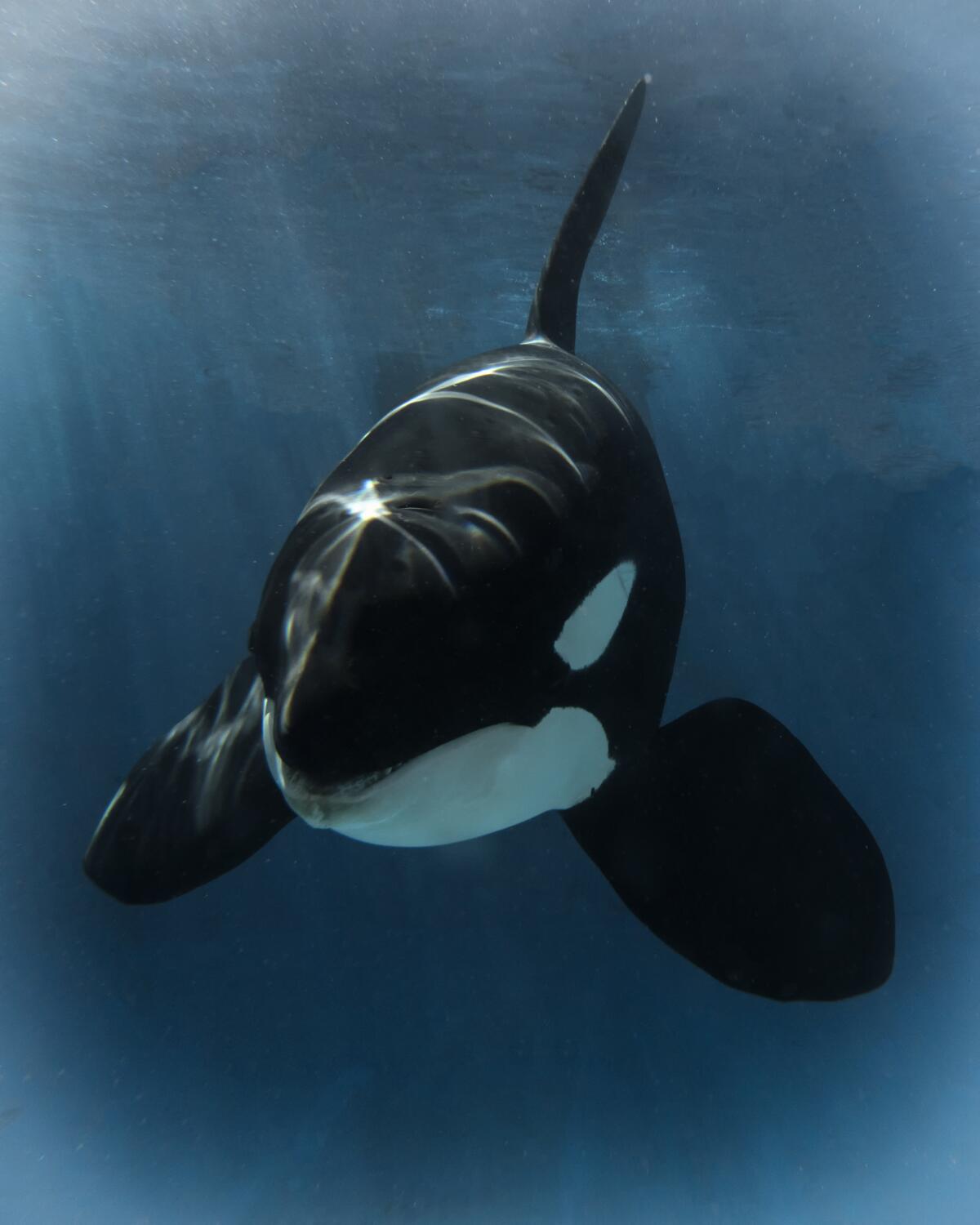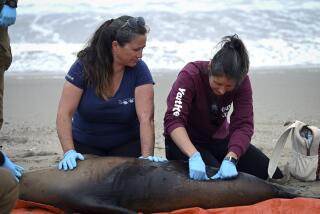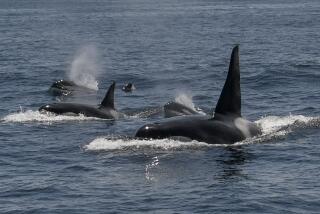Nakai, SeaWorld’s 20-year-old killer whale, dies after treatment for infection fails

- Share via
SAN DIEGO — A 20-year-old killer whale that has been at SeaWorld San Diego since his birth died Thursday night following treatment for an infection, the park announced Friday.
Despite aggressive efforts to treat the infection, the orca, Nakai, died surrounded by members of the animal care and medical teams who had worked closely with him over the last two decades, SeaWorld San Diego said in a statement.
Nakai’s death leaves SeaWorld with eight remaining killer whales, ranging in age from 9 to 57. The marine park is unable to expand its orca population after adopting a breeding ban in March 2016 following years of pressure from animal rights advocates and shifting public opinion about orcas being held in captivity.
Nakai, born in September 2001 at SeaWorld, was the second orca to die at the park in the past year. Amaya, a 6-year-old female, died Aug. 20, 2021. Before that, the most recent death was that of Kasatka, a 42-year-old female who died from a lung disease in August 2017.
“Every attempt was made to save [Nakai’s] life,” SeaWorld said in a statement. “Veterinarians and health specialists had been actively treating an infection, but aggressive therapeutic and diagnostic efforts were unsuccessful.”
The park did not specify what kind of infection killed the orca.
The animal welfare group People for the Ethical Treatment of Animals said that on Friday morning, just hours after Nakai died, a SeaWorld visitor sent the organization a video showing “a violent attack between orcas ... resulting in a serious wound to at least one of the animals.”
The PETA statement pointed out that Nakai was also attacked in 2012 “when he was kept in a tiny concrete tank with incompatible orcas,” resulting in the loss of a chunk of his jaw.
“In two days, one orca has died and another has been attacked by other frustrated, tightly confined orcas, leaving him with a serious injury — and young children as witnesses to the carnage,” Tracy Reiman, PETA’s executive vice president, said in a statement. “PETA is calling on the [U.S. Department of Agriculture] to investigate SeaWorld for holding animals in conditions so stressful they would lead to horrific attacks, and reminds families to stay away from any park that imprisons these animals.”
A SeaWorld spokesperson wrote in an email that the PETA video “is misleading and misconstrued,” citing two recent scientific papers to argue the video showed “common orca behaviors exhibited by both wild populations and those in human care as part of natural social interactions.”
SeaWorld said in a statement that Nakai will “be remembered as a curious and quick learner, often picking up behaviors just by observing the other whales in his pod.”
The park said that skill prompted scientists to use Nakai in hearing studies that sought to better understand how noise from ships and other human activity impacted orcas.
“His contributions to helping improve the health and survival of whales in the wild cannot be underestimated and will never be forgotten,” the statement said.
An unnamed member of Nakai’s team who helped care for the killer whale since his birth described Nakai in the statement as a “very friendly and an overall playful guy who loved to interact with people.”
Criticism regarding SeaWorld’s killer whale populations has intensified over the past decade following the release of the 2013 documentary “Blackfish,” which focused on the life of Tilikum, an orca responsible for killing trainer Dawn Brancheau in 2010 when he dragged her into a pool at SeaWorld Orlando in Florida. The movie implied that orcas become more aggressive in captivity.
SeaWorld subsequently announced it was ending killer whale shows at its parks. In 2017, the San Diego park became the first location to replace its traditional, trick-laden Shamu performances with an educational program that highlights the orcas’ natural behaviors in the wild.
More to Read
Updates
8:56 a.m. Aug. 6, 2022: This story was updated with SeaWorld’s response to the video released by PETA.
8:56 a.m. Aug. 6, 2022: This story was updated with additional details.
Sign up for Essential California
The most important California stories and recommendations in your inbox every morning.
You may occasionally receive promotional content from the Los Angeles Times.












